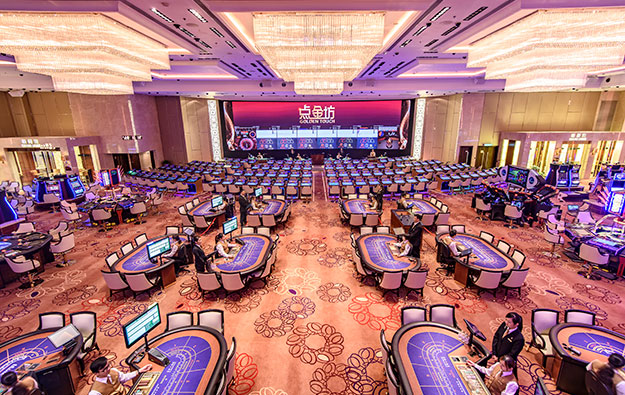No near-term clarity on Macau casino permits: analysts
Jul 11, 2017 Newsdesk Latest News, Macau, Top of the deck

Investors are unlikely to get clarity any time soon regarding what will happen when the gaming permits of Macau’s six current casino operators expire on various dates between 2020 and 2022.
That is the message in several notes from investment analysts. The memos were issued following Monday comments on the licensing issue made by Lionel Leong Vai Tac, the city’s Secretary for Economy and Finance.
Mr Leong reportedly said the Macau government would analyse various options – including the possibility of legal amendment to existing terms and conditions – regarding any extension of gaming rights for Macau’s current gaming concessions and sub-concessions. Those current permits can be extended in increments of time to a maximum of five years from their original expiry date. After that, a new concession process must take place, involving a new public tender, according to a Macau gaming law expert recently interviewed by GGRAsia.
“Uncertainty… will continue to leave investors with questions,” said a Tuesday note from brokerage Sanford C. Bernstein Ltd.
Commenting on what might happen in relation to any bid process occurring once extension options on the current concessions are exhausted, Sanford Bernstein analysts Vitaly Umansky, Zhen Gong and Yang Xie wrote: “The government will most certainly run some form of an RFP [request for proposal] process with criteria that will make existing concessionaires the evident winners of new concessions (effectively renewals), but likely under new terms, with a potential for economic costs.”
The brokerage cited the land concessions issued by the government to the current gaming operators as supporting evidence for its view that the current six operators would be allowed to remain in the market. In many cases the expiry date of a land concession falls later than the gaming concession attached to it.
“The real estate built upon the land is tied to the land concessions (not the gaming concessions) – except for the actual casino footprint and gaming equipment which fall under the gaming concessions. In the event that an existing concessionaire fails to be effectively renewed [sic], the Macau government can only take possession of the casino areas and equipment (not the remaining assets). Unless the original concessionaire is willing to cooperate and settle for only non-gaming incomes, it would be virtually impossible for the government and a new entrant to operate in the existing properties,” said Sanford Bernstein.
A Monday note from Union Gaming Securities Asia Ltd analyst Grant Govertsen stated: “We don’t expect to hear much more about the nuts and bolts of the licensing process this year or even next. Keep in mind that the licence expirations will occur under the next government’s watch and we would therefore expect the next government to have an outsized say on the licensing process.”
Next administration
The expiry dates for the current gaming permissions fall beyond the end of the current five-year term of Macau’s Chief Executive, Fernando Chui Sai On, who first took office on December 20, 2009. Mr Chui is barred by law from running for a third consecutive term as Chief Executive.
Relevant Macau law says that any extension to the current concessions and sub-concessions could be accompanied by a change in terms and conditions. If the current concession holders were subsequently to bid for new concessions and be successful, the terms of such new concessions could also be different from the existing ones.
Sanford Bernstein said one scenario for new terms and conditions post 2020 and 2022 – a scenario it thought most likely to occur – was for “higher taxes” and possibly “fees up front or payable over time”.
“A higher tax on mass [play] could be imposed, which would not necessarily have an impact on GGR [gross gaming revenue] generation (and such a bifurcated tax rate already exists in some other jurisdictions around Asia),” noted the brokerage.
Macau operators currently have an effective 39 percent rate of tax on GGR, with the exception of SJM Holdings Ltd, which pays 38 percent, and in return provides dredging services for local waterways.
Other tools available to the government in the future could be an end to exemption from corporate tax on gaming derived business, “resulting in a higher tax burden,” stated Sanford Bernstein.
Future concessionaires might also “be required to invest capital in more non-gaming developments,” added the institution.
Related articles
-
 Sands China 2Q EBITDA down q-o-q amid...
Sands China 2Q EBITDA down q-o-q amid...Jul 25, 2024
-
 Macau average 5-star 1H rate 96pct of...
Macau average 5-star 1H rate 96pct of...Jul 22, 2024
More news
-
 Donaco EBITDA up y-o-y to above US$4mln...
Donaco EBITDA up y-o-y to above US$4mln...Jul 26, 2024
-
 HK listed Palasino upgrades Czech...
HK listed Palasino upgrades Czech...Jul 26, 2024
Latest News
Jul 26, 2024
Border-casino operator Donaco International Ltd has achieved a 164.17-percent year-on-year increase in its latest quarterly group earnings before interest, taxation, depreciation and amortisation...Sign up to our FREE Newsletter
 (Click here for more)
(Click here for more)
Pick of the Day
”We’ve got more traction outside of Macau at the moment. But Macau’s going be a bigger focus for us”
David Punter
Regional representative at Konami Australia
Most Popular
 Sheraton brand to exit Londoner Macao, to be Londoner Grand July 25, 2024
Sheraton brand to exit Londoner Macao, to be Londoner Grand July 25, 2024  Macau regulator probes unlicensed gaming agents July 24, 2024
Macau regulator probes unlicensed gaming agents July 24, 2024  Philippines gives 20k aliens in POGOs 60 days to leave July 25, 2024
Philippines gives 20k aliens in POGOs 60 days to leave July 25, 2024  Philippines-listed DigiPlus says not affected by POGO ban July 24, 2024
Philippines-listed DigiPlus says not affected by POGO ban July 24, 2024  Sands China 2Q EBITDA down q-o-q amid low hold, renovation July 25, 2024
Sands China 2Q EBITDA down q-o-q amid low hold, renovation July 25, 2024






